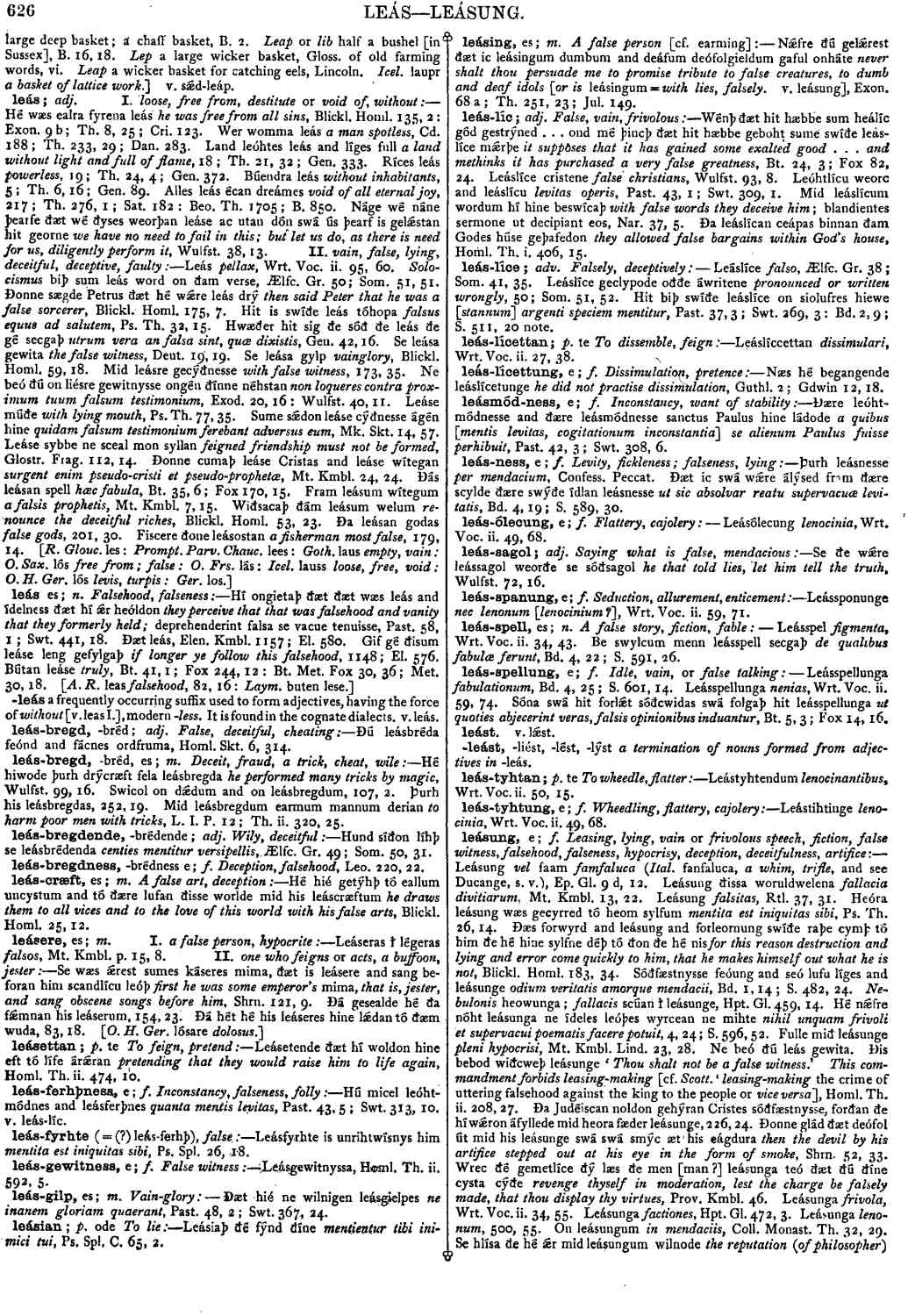leás
- adjective
-
Hé wæs ealra fyrena leás
he was free from all sins,
- Blickl. Homl. 135, 2 :
- Exon. 9 b ;
- Th. 8, 25 ;
- Cri. 123.
-
Wer womma leás
a man spotless,
- Cd. 188 ;
- Th. 233, 29 ;
- Dan. 283 .
-
Land leóhtes leás and líges full
a land without light and full of flame,
- 18 ;
- Th. 21, 32 ;
- Gen. 333 .
-
Ríces leás
powerless,
- 19 ;
- Th. 24, 4 ;
- Gen. 372 .
-
Búendra leás
without inhabitants,
- 5 ;
- Th. 6, 16 ;
- Gen. 89 .
-
Alles leás écan dreámes
void of all eternal joy,
- 217 ;
- Th. 276, 1 ;
- Sat. 182 :
- Beo. Th. 1705 ;
- B. 850 .
-
Náge wé náne þearfe ðæt wé ðyses weorþan leáse ac utan dón swá ús þearf is gelǽstan hit georne
we have no need to fail in this; but let us do, as there is need for us, diligently perform it,
- Wulfst. 38, 13 .
-
Leás
pellax,
- Wrt. Voc. ii. 95, 60.
-
Solocismus
biþ sum leás word on ðam verse,
- Ælfc. Gr. 50 ;
- Som. 51, 51 .
-
Ðonne sægde Petrus ðæt hé wǽre leás drý
then said Peter that he was a false sorcerer,
- Blickl. Homl. 175, 7 .
-
Hit is swíðe leás tóhopa
falsus equus ad salutem,
- Ps. Th. 32, 15 .
-
Hwæðer hit sig ðe sóð ðe s ðe gé secgaþ
utrum vera an falsa sint, quæ dixistis,
- Gen. 42, 16 .
-
Se leása gewita
the false witness,
- Deut. 19, 19 .
-
Se leása gylp
vainglory,
- Blickl. Homl. 59, 18 .
-
Mid leásre gecýðnesse
with false witness,
- 173, 35 .
-
Ne beó ðú on liésre gewitnysse ongén ðínne néhstan
non loqueres contra proximum tuum falsum testimonium,
- Exod. 20, 16 :
- Wulfst. 40, 11 .
-
Leáse múðe
with lying mouth,
- Ps. Th. 77, 35 .
-
Sume sǽdon leáse cýðnesse ágén hine
quidam falsum testimonium ferebant adversus eum,
- Mk. Skt. 14, 57 .
-
Leáse sybbe ne sceal mon syllan
feigned friendship must not be formed,
- Glostr. Frag. 112, 14 .
-
Ðonne cumaþ leáse Cristas and leáse wítegan
surgent enim pseudo-cristi et pseudo-prophetæ,
- Mt. Kmbl. 24, 24 .
-
Ðás leásan spell
hæc fabula,
- Bt. 35, 6 ;
- Fox 170, 15 .
-
Fram leásum wítegum
a falsis prophetis,
- Mt. Kmbl. 7, 15 .
-
Wiðsacaþ ðám leásum welum
renounce the deceitful riches,
- Blickl. Homl. 53, 23 .
-
Ða leásan godas
false gods,
- 201, 30 .
-
Fiscere ðone leásostan
a fisherman most false,
- 179, 14.
Bosworth, Joseph. “leás.” In An Anglo-Saxon Dictionary Online, edited by Thomas Northcote Toller, Christ Sean, and Ondřej Tichy. Prague: Faculty of Arts, Charles University, 2014. https://bosworthtoller.com/21279.
Checked: 1